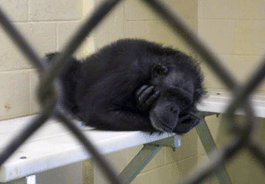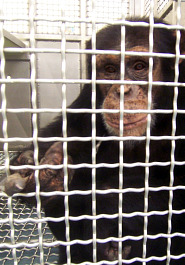Veterinary Support Needed to End the Use of Chimps in ResearchOctober 6, 2009  Chimps are highly intelligent and complex beings that need cognitive and emotional stimulation. The HSUS In the wake of the recent undercover investigation of the New Iberia Research Center (NIRC) in Louisiana, which revealed routine and unlawful mistreatment of hundreds of chimpanzees and other primates, there has been renewed debate about subjecting our closest living and endangered relatives to such abusive treatment. The Evidence BuildsHSVMA believes there are several reasons why the veterinary community should step forward to oppose the continued use of chimpanzees in research and testing:
HSVMA and The Humane Society of the United States (HSUS) believe that chimpanzees should be granted the freedom from being subjected to invasive experimentation given their prodigious cognitive and emotional capacities. The general public agrees, as demonstrated by national opinion polls. Support is NeededWe are seeking support from the scientific and academic communities, including the veterinary profession, for the prompt phasing out of such chimpanzee use and the permanent retirement of chimpanzees currently in biomedical research facilities to suitable sanctuaries.  Investigations reveal animals forced to endure anxiety and misery behind the razor wire of research facilities. The HSUS We ask you to join over 350 advanced scientists—including PhDs, DVMs, and MDs—and others with direct experience working with chimpanzees in a laboratory setting who have already endorsed the following statement regarding the use of chimpanzees for invasive research and testing in the United States: "We, the undersigned members of the scientific and academic community, support efforts to end the use of chimpanzees for biomedical research and testing in the United States and to provide them permanent sanctuary." If you agree to the above statement and would like to sign on in support, please send an email to Kathleen Conlee, Director of Program Management, Animal Research Issues at The HSUS. Please indicate what state you live in and whether you are signing as an individual or on behalf of an institution. If you are speaking for an institution, we will indicate you have signed "on behalf of" your institution. If you sign as an individual, your affiliation will only be provided for identification purposes; however, if you do not want your affiliation included at all, please make sure you clearly indicate such in your reply. Your information will then be added to the compiled list of supporters, which will be used to demonstrate the support of the scientific/academic communities to policymakers. For more information on The HSUS's work on behalf of chimpanzees in laboratories, visit the Chimps Deserve Better campaign. |

